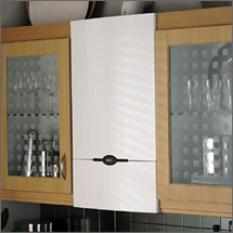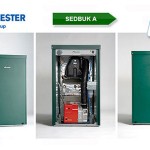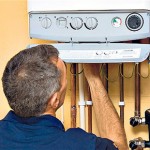Non-Condensing Gas Boilers: Advantages and Disadvantages
If you have decided that your gas boiler is too old and needs to be changed, there are a lot of ways to do it. Achievements of the modern science and techniques allow you to choose a new boiler among combination or combi boilers, heat only boilers, system boilers and back boilers. These are the main types of condensing boilers which are considered to be the modernest, the cleanest and the ‘greenest’ way to heat your home. As a result, during the latest five years more than eight million ‘condensing boilers’ appeared in homes across the whole Britain.

The fact of the matter is that people were really impressed by the number of the benefits of condensing gas boilers (high energy efficiency, environmental safety, less cycling, lower fuel bills, compact sizes, etc.) and didn’t even imagine what a great problem they would face in the near winter. Hundreds of thousands of people found themselves trembling because their shiny new boilers had broken without a warning. For example, Charlie Mullins, MD of Pimlico Plumbers in London, mentioned that in that period f time they had had two times more call-outs as in the same period before. That happens because in cold weather the pipe that must take waste water from the back of the condensing boiler just freezes and causes shutting down of the whole system. Then it was found out that almost 90% of advertised benefits of condensing gas boilers were myths.
So we think that it is time to recollect our old and reliable non-condensing gas boilers that also have its pros and cons.
Disadvantages of non-condensing gas boilers:
- Lower energy efficiency. Older gas boilers are considered to be 15-30% less energy efficient than condensing gas boilers. Modern non-condensing boilers are around 15% less efficient than condensing ones. It means that your running costs may be considerably cut down.
- Environmentally dangerous. Non-condensing boilers produce more CO2 emissions than condensing ones.
- More cycling. It means that non-condensing gas boilers don’t regulate heat output completely. This fact signifies that gas consumption can’t be reduced because you need to switch it on and off all the time.
Advantages of non-condensing gas boilers:
- Work in any weather. In boilers of this type there is no pipe which should take the water from the back of the boiler so your pipes can’t be frozen in any weather and there is no risk to get cold or to cause permanent damage in your house or office.
- Lower price. Usually, these gas boilers are cheaper than condensing ones. Moreover, you should know that an ordinary condensing boiler costs nearly ?2,000.
- Chemically clean. The condensed water produced by the new condensing boilers includes dissolved nitrogen and sulphur oxides. It can be very dangerous for the members of your family and, most likely, will cause corrosion of delicate boiler components and lead breakdowns. At the same time a non-condensing boiler isn’t acidic at all.
- Compact size and modern design. Now all the boilers of this type are perfectly designed and are produced with modern materials so you will be able to put your boiler in the most suitable place.
So we advise you to think well before buying a new boiler. Maybe, there is no sense to throw out a working old non-condensing boiler and change it with a condensing one. Or if you don’t have any boiler, check carefully which one you really need.
- popular
- new






